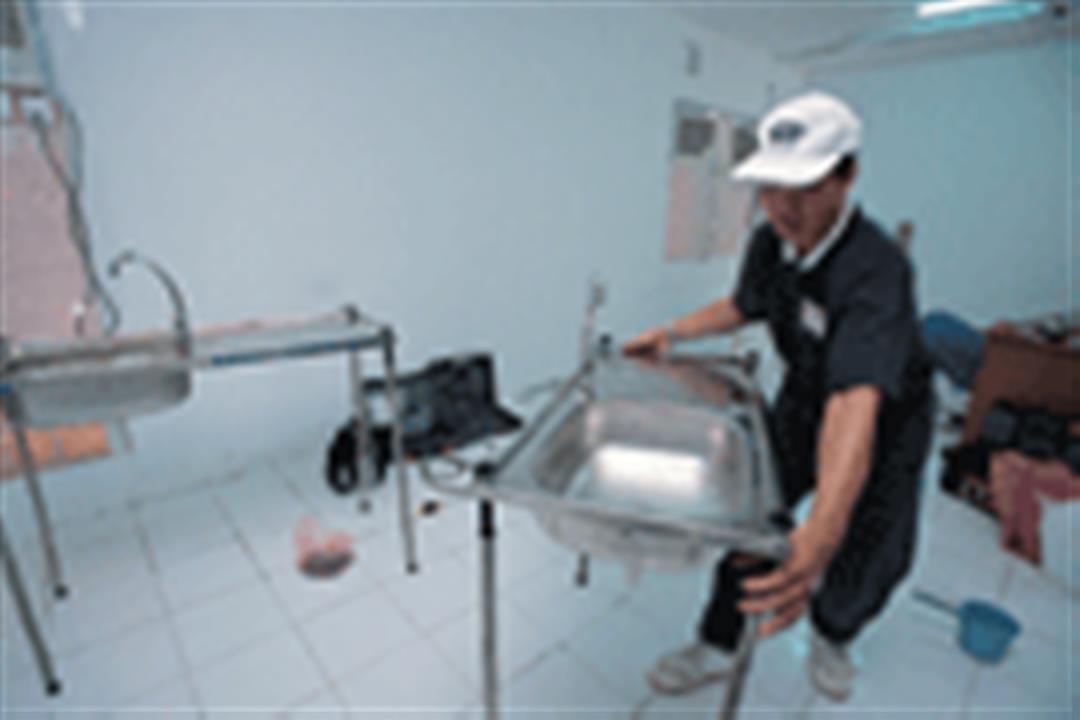Body and soul
Early on a March morning on Batam island, the sun is already intense, and even at 8:00 the air temperature is so hot that "the dog won't go out even if you beat it." Yet, when you enter the volunteer clinic that Tzu Chi has set up in the Batu Aji technical training center, there is an atmosphere of vitality and playfulness reminiscent of a summer camp.
Just inside the door, a volunteer in signature blue shirt and white pants approaches you to ask what type of doctor you wish to consult. If it is internal medicine, you can register in front of the assembly hall. For dentistry, surgery, or ophthalmology, you need to go over to the tent set up on the lawn, where you can check your name against the list and they will give you a number. There are unlimited drinks for waiting patients who are thirsty, and bread for those who are hungry.
Nearby, primary school students line up in a cafeteria to see the young dentist from Singapore. To maximize efficiency, volunteers separate out and make a list of those who need fillings or teeth pulled. Each child also receives a small backpack, which includes toothpaste, a toothbrush, and a rinsing cup, so that after the kids return home they can keep their teeth clean according to the dentist's instructions.
In charge of general medicine in the assembly hall is a Muslim woman doctor, wearing a beautiful tudong (Muslim headscarf), gently asking each patient where it hurts. Across a lawn from the assembly hall, in a space where the dentist has set up, little children, fearful of having their teeth pulled, eyes filling with tears, seem anxious to escape. The doctor from Singapore, speaking to them in Malaysian, 70-80% of which is similar to Indonesian, stays busy trying to keep them mollified. Next door to the dentist is the eye surgery room, where sophisticated equipment, flown in from Singapore only the day before, has been set up.
In the innermost chamber is the surgical theater, divided into three sections-hernia, cleft lip and palate, and tumors. While family members patiently wait under the tent outside, inside, where air conditioners (hastily set up only a couple of days before) clank away noisily, patients in various stages of surgery are laid out on ten provisional operating tables made up out of desks and chairs. Amazingly, their expressions do not show the least fear; on the contrary, they appear to be looking forward to treatment.
Each Tzu Chi volunteer has a specific responsibility, and everything is done in an orderly fashion. A group of Tzuchians mingles with the crowd, trying to put patients at ease. Suddenly the sound of song bursts out from the waiting area, and little children dance along with the music. Meanwhile, several volunteers spontaneously and inconspicuously detach themselves from the crowd, grab tongs and plastic bags, and begin picking up trash.
If you look beyond the fact that the facilities are jerry-rigged, the entire setup is like a duplicate of the Tzu Chi Hospital in Hualien, Taiwan. And as at Tzu Chi Hospital, here they take responsibility for treating not only bodily illnesses, but also the mental anguish of patients and their families.

Each Tzu Chi volunteer has specific responsibilities-(left to right) setting up a sink for the surgical theater, prepping for tooth extractions, sterilizing instruments, serving or preparing food-so that, in an orderly fashion, they build an instant hospital in a day. Even the eating times are staggered, so that there are always volunteers on duty.